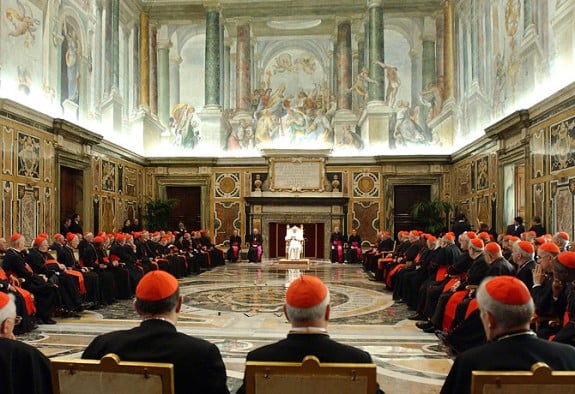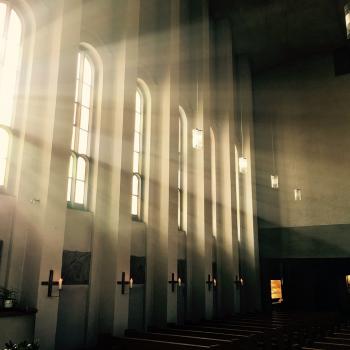
If you think the magisterium is sitting for a class picture above, think again.
Deacon Bill Ditewig returns to the blogosphere — yay! — with a new look for his blog, along with a fresh look at one of the most misunderstood terms in all Catholicism:
If a quick survey of certain web sites is any indication, many people seem to think that magisterium is a “who”: the Pope, for example, or the Pope and the world’s bishops, or the Pope and the curia in Rome. Actually, this is not accurate. Magisterium, linguistically, is a neuter noun; it is a “what”, not a “who.” It is “the teaching authority of the Church.” And, as we all know, “the Church” is more than its episcopal leadership. Let’s consider a few basics.
Why do we claim any sort of teaching authority at all? It seems rather presumptuous to think that we human beings can teach with authority about spiritual matters. Remember that this was shocking to some of Jesus’ own listeners, when they observed that “this man teaches with authority.” Magisterium is founded on the promise of Christ that the Holy Spirit will remain present and active in the community of disciples. Consider John 14:26: “The Advocate, the holy Spirit that the Father will send in my name — he will teach you everything and remind you of all that I told you.” It is the Holy Spirit who teaches, no human authority.
The Holy Spirit is given to everyone at Baptism, and indeed, through all of the sacramental life of the Church. In the Middle Ages a distinction was introduced between the ecclesia docens (the teaching Church) and the ecclesia discens (the learning Church). However, of course, all of us participate, in a variety of degrees, in the one and the same teaching-and-learning Church. The role of the ordained is often highlighted. Vatican II spoke of the teaching role of bishops and presbyters as their primary obligation (the primum officium); subsequent documents have extended this as well to the renewed (permanent) diaconate as well. While one can sometimes read (usually in very derogatory terms) that others are claiming magisterial authority as well (consider some recent nasty blog posts about “the magisterium of the nuns” when criticizing the LCWR, for example), the medieval Church DID extend its understanding of magisterium beyond the bishops themselves. No less a theological giant than Thomas Aquinas in the 13th Century, wrote of the magisterium of university theologians; at the great Council of Trent in the 16th Century, and at Councils before that, the theological experts were often given a vote on conciliar texts! Trent, for example, referred to the theologians as minor theologians and the bishops as major theologians. Some votes included them all; some were restricted to the bishops alone.
And welcome back, Triple D!















